This page is based on this
Wikipedia article Text is available under the
CC BY-SA 4.0 license; additional terms may apply.
Images, videos and audio are available under their respective licenses.
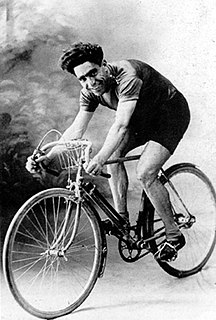
Gaetano Belloni was an Italian professional road racing cyclist. The highlights of his career were his overall win in the 1920 Giro d'Italia, the two victories in Milan–San Remo, and the three victories in the Giro di Lombardia.

Francesco (Franco) Antonio Faccio was an Italian composer and conductor. Born in Verona, he studied music at the Milan Conservatory from 1855 where he was a pupil of Stefano Ronchetti-Monteviti and, as scholar William Ashbrook notes, "where he struck up a lifelong friendship with Arrigo Boito, two years his junior" and with whom he was to collaborate in many ways.
Macbeth is a silent Italian 1909 film adaptation of the William Shakespeare play Macbeth. It was the second Macbeth film released that year, and is the third film version of the play. The film was directed by Mario Caserini, and starred Dante Cappelli, Maria Caserini, Amleto Palormi, and Ettore Pesci. The running time is 16 minutes and it is a black-and-white film.
One Hamlet Less is a 1973 Italian drama film directed by Carmelo Bene. It was entered into the 1973 Cannes Film Festival.
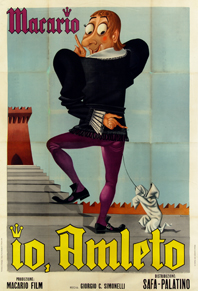
Io, Amleto is a 1952 Italian comedy film directed by Giorgio Simonelli. A parody of William Shakespeare's tragedy Hamlet, its lack of commercial success led the newly formed production company Macario Film to a rapid bankruptcy.
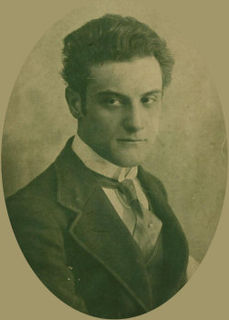
Amleto Palermi was an Italian film director and screenwriter. He directed 71 films between 1914 and 1942. He directed The Old Lady, which starred Vittorio De Sica in his first sound film.
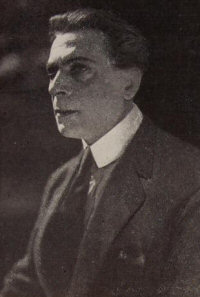
Amleto Novelli was an Italian film actor of the silent era. He appeared in 110 films between 1909 and 1924.

Fabiola is a 1918 Italian silent historical film directed by Enrico Guazzoni and starring Augusto Mastripietri, Amleto Novelli and Elena Sangro. It is an adaptation of the 1854 novel Fabiola by Nicholas Patrick Wiseman about the rise of Christianity in the Roman Empire. It was one of a series of historical epics for which the Italian film industry became famous during the era. The novel was later turned into a sound film Fabiola in 1949.
Halmet (Italian:Amleto) is a 1917 Italian silent drama film directed by Eleuterio Rodolfi and starring Ruggero Ruggeri, Helena Makowska and Mercedes Brignone. It is an adaptation of William Shakespeare's play Hamlet.

Agrippina is a 1911 Italian silent historical film directed by Enrico Guazzoni and starring Adele Bianchi Azzarili, Amleto Novelli and Maria Caserini. The film portrays the life of Agrippina the Younger, and was part of the move towards Roman epics in early Italian cinema.

Julius Caesar is a 1914 Italian silent historical film directed by Enrico Guazzoni and starring Amleto Novelli, Bruto Castellani and Pina Menichelli. Taking its inspiration from William Shakespeare's 1599 play of the same title, the film portrays the events leading up to the assassination of Julius Caesar. In the wake of Guazzoni's internationally successful Quo Vadis it was produced on an epic scale, including vast sets recreating Ancient Rome and more than 20,000 extras.

Antony and Cleopatra is a 1913 Italian silent historical film directed by Enrico Guazzoni and starring Gianna Terribili-Gonzales, Amleto Novelli and Ignazio Lupi. The film is an adaptation of William Shakespeare's play of the same title, with inspiration also drawn from a poem by Pietro Cossa.
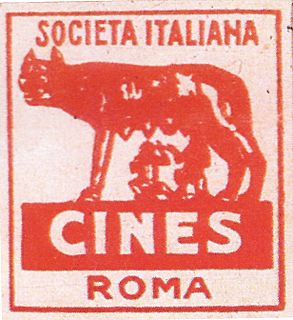
The Società Italiana Cines is a film company specializing in production and distribution of films. The company was founded on 1 April 1906.
In 1930, at the time of the rebirth of Italian cinema, the old label had produced The Song of Love, the first sound film in Italy. The new Cines Studios were constructed in Rome.
In 1956 he received the Nastro d'Argento for Best Producer.
However, in 1958, the Cines ceased operations and was liquidated by the Ministero del Tesoro.
In 2006, on the occasion of the centenary of the very first foundation, through the work of the editorial group Persians Publisher - New Media Entertainment has been given life to a new Cines, with an essentially private, who recovered the brand and the artistic legacy of the previous management.
The Volpi Cup is the principal award given to actors at the Venice Film Festival and is named in honor of Count Giuseppe Volpi di Misurata, the founder of the Venice Film Festival. The name and number of prizes have been changed several times since their introduction, ranging from two to four awards per edition and sometimes acknowledging both leading and supporting performances.
The House of Pulcini is a 1924 Italian silent film directed by Mario Camerini and starring Diomira Jacobini, Amleto Novelli and Franz Sala.
The Sons of the Marquis Lucera is a 1939 Italian comedy film directed by Amleto Palermi and starring Armando Falconi, Caterina Boratto and Sergio Tofano. It is based on a play of the same name by Gherardo Gherardi.










